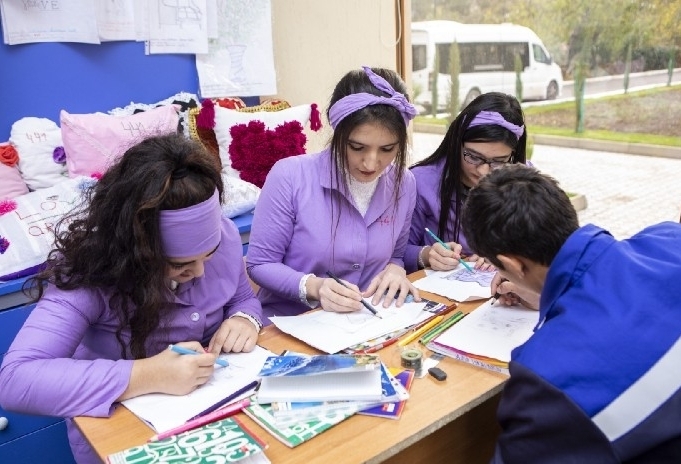



Preparing Azerbaijan’s youth for the jobs of the future

Baku, December 17, AZERTAC
“Modernising and investing in vocational education and training is at the heart of the Government’s, the European Union’s and UNDP’s strategic vision for preparing the youth of Azerbaijan to take up the jobs of the future and adapting to the changing landscape of labour markets,” says the article published on the website of the United Nations Development Program (UNDP) Azerbaijan - Medium.
The article, co-written by Head of EU Delegation to Azerbaijan Kestutis Jankauskas, UNDP Resident Representative in Azerbaijan Alessandro Fracassetti and Director of the State Agency for Vocational Education in Azerbaijan Parviz Yusifov, says: “Azerbaijan’s labour market is changing rapidly in line with the growing diversification and digitalisation of the economy, calling for new types of training and skills to ensure that young people can take up new opportunities and that no-one is left behind.
For the past three years, we have been working closely together to help create inclusive training opportunities through vocational education in skills demanded in the labour market.
Such training has a crucial role to play in supporting the modernisation and diversification of the country’s economy, helping to future-proof and expand newly emerging industries while preserving viable traditional sectors.
Today more than ever, the availability of a skilled and competent workforce is critical to achieve the goal of a sustainable diversified economy.
Recent studies have shown that 6 out of 10 jobs in the future will require a vocational training qualification.
Nearly 45% of adults have the potential for upskilling and reskilling (a figure estimated before the pandemic); the crisis, combined with the twin transitions, will make upskilling and reskilling even more important.
We are confident that the vocational training sector can lead Azerbaijan into the digital future by helping to retain and grow jobs, prevent skills shortages and boost the economy by becoming more agile and accessible to workers of all ages.
By investing in high-quality vocational education, our strategy further contributes to the Sustainable Development Goal of ensuring inclusive and equitable quality education and promoting lifelong learning opportunities for all (SDG4).
Our partnership has already achieved some impressive results over the past three years, including the modernization of equipment and infrastructure in VET schools located in Ganja and Jalilabad, the provision of professional development training for management and teaching staff in these regions, and the development of new curricula, teaching modules and short courses in areas such as IT and programming and fashion design.
Responding to the outbreak of COVID-19, we swiftly adapted the delivery of these VET courses from primarily face-to-face teaching to TV lessons and online learning.
We’ve also helped boost the skills and employability of graduates by involving local businesses in the educational process. These private businesses have been providing early internship opportunities for future graduates and offering them jobs upon graduation.
Another notable achievement to ensure greater inclusiveness in vocational education is that the number of women students involved in VET in Jalilabad region has increased from below 2 percent to 10.6 percent over the past two academic years.
Furthermore, our efforts to reshape the VET system by bringing in international best practices and improving the overall image of VET education has led to a number of VET studies applicants by 27% in comparison to the previous academic year.
Any effective strategy to modernize VET not only needs to ensure that courses are of high quality and matched to the needs of the labour market but also must promote the status of VET and the recognition of VET qualifications.
This is why we have already undertaken several public-awareness initiatives to revamp the image of vocational training and introduced new mechanisms for the recognition and validation of formal and non-formal learning. (The first certifications were awarded a month ago.)
This year will see the launch of a new four-year joint project to bring about a major modernisation of the vocational education sector, scaling up these efforts to promote VET and bringing all key stakeholders together to change the discourse around vocational education, benefitting some 5,000 students at VET centres throughout the country through the modernisation of their institutions.
The underlying objective of all our efforts to modernize VET is building forward towards a more inclusive, equitable and sustainable economy with quality training and employment opportunities for all — especially the most vulnerable whose futures are at stake in these challenging times.”
Turkish study identifies microplastics in brain cells
ADA University-hosted Caspian Basin Studies Program wraps up
Turkish AI defense firm secures investment at valuation of $12.5M